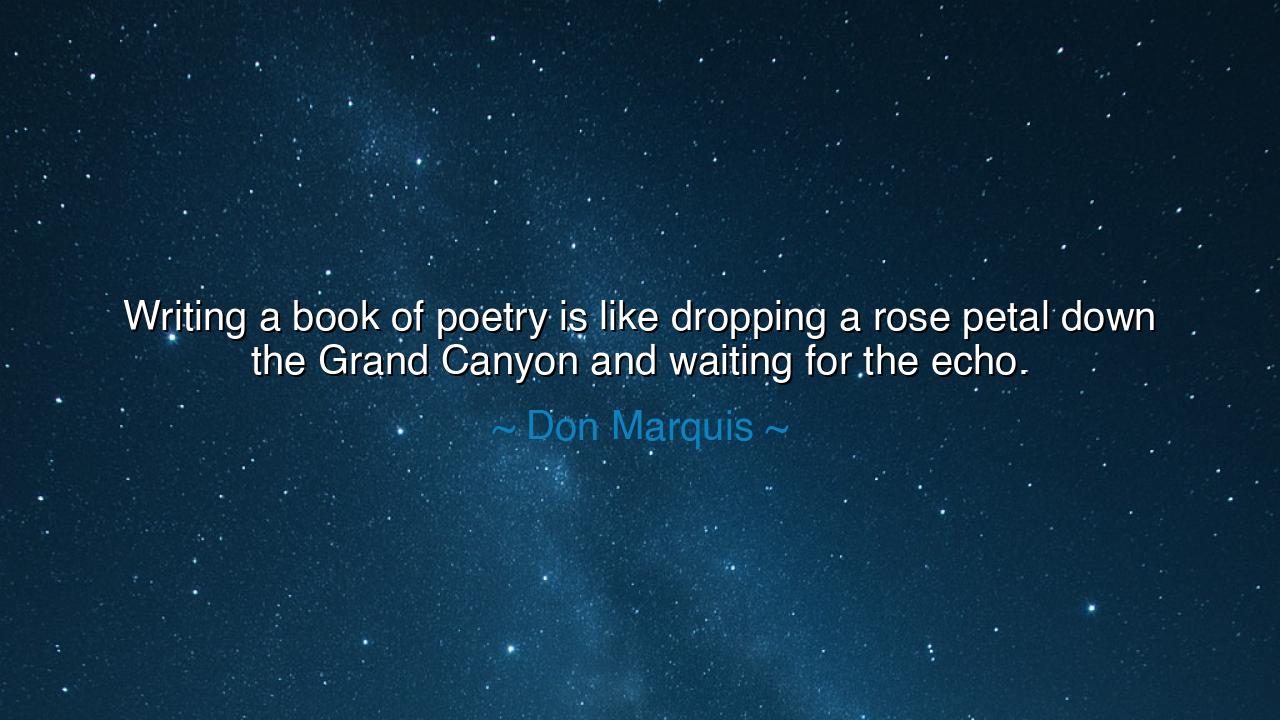
Writing a book of poetry is like dropping a rose petal down the
Writing a book of poetry is like dropping a rose petal down the Grand Canyon and waiting for the echo.






Hear the words of Don Marquis, who once proclaimed: “Writing a book of poetry is like dropping a rose petal down the Grand Canyon and waiting for the echo. This saying is not a lament alone, but also a truth spoken with both humor and sorrow, for it reveals the paradox of the poet’s labor: the work is delicate, fragile as a rose petal, yet it is cast into a world vast, indifferent, and echoing like the Grand Canyon. To publish poetry is to send forth beauty into immensity, uncertain if it will ever return, uncertain if anyone will hear.
For what is a rose petal? It is a symbol of tenderness, of fleeting fragrance, of beauty that withers as soon as it is born. Poetry is made of such petals: small, fragile words, arranged with care, carrying both love and grief, both simplicity and mystery. Yet when the poet releases this petal, he does not drop it into a garden where others may admire it immediately; he drops it into the Grand Canyon, a chasm so vast that it swallows sound, a metaphor for the wide, distracted world. Who will hear it? Who will catch it? Who will know it was ever dropped at all?
This is the poet’s burden. Many poets have labored in obscurity, sending their petals into the abyss without hearing an echo in their lifetimes. Consider Emily Dickinson, who wrote hundreds of poems in seclusion, unknown to the world, her work like rose petals cast into silence. Only after her death did the echoes return, as her words spread across generations and stirred millions of hearts. Marquis’s quote captures this strange loneliness—the act of giving everything, yet not knowing when, or if, the world will respond.
And yet, the metaphor is not despair alone. For though the poet waits long, echoes do return. The Grand Canyon, though vast, does not destroy sound—it carries it back, transformed, magnified, delayed. So it is with poetry: though the response may be faint or far away, though it may come years or centuries later, it does come. Homer’s epics still echo across millennia. The songs of Rumi, written in thirteenth-century Persia, now reach the ears of men and women in modern lands. The petal, once dropped, does not vanish—it begins a journey whose echo may outlive the poet himself.
There is also humility in Marquis’s vision. He reminds us that poetry, however grand it feels to its maker, is small compared to the immensity of life, time, and humanity. A petal cannot fill the canyon; a poem cannot solve every sorrow. Yet even smallness has its place. A petal may seem fragile, but its beauty is eternal; a poem may seem slight, but it can awaken souls, kindle revolutions, or comfort the brokenhearted. It is not size that gives it power, but the purity of its essence.
Therefore, O children of tomorrow, take this lesson: do not measure your work only by the echo it brings, nor despair if your rose petal falls into silence. Your task is not to control the canyon, but to cast the petal faithfully. Write with honesty, release your beauty into the world, and trust that the echo, though delayed, will find its way. For no true word, no true song, no true poem is ever lost—it waits, like a seed, until the time comes for it to bloom in another heart.
So remember the wisdom of Don Marquis: to write poetry is to act with both courage and patience. It is to accept the vastness of the world, and still to offer it your most delicate gift. Drop your petals into the canyon, and wait—not with despair, but with hope. For the canyon will answer in its own time, and when it does, the echo will carry farther than you ever dreamed. This is the destiny of poetry: fragile at birth, eternal in echo.






NNHD
There’s a bittersweet humility in this idea. It suggests that poets send their words into the world without guarantees, much like prayers or wishes. I wonder if that’s why poetry endures—because it thrives on hope more than certainty. Even if no echo returns, the poet has still dared to speak into the silence, and that’s a kind of courage few possess.
NNghia
This makes me wonder how much of poetry’s value depends on being read. If no one hears the echo, does the rose petal still matter? I think it does. The beauty exists regardless of acknowledgment. Still, it’s hard not to crave that faint echo—to feel that somewhere, someone caught the same rhythm and emotion that you tried to share.
THThd Ht
I feel both admiration and melancholy in this comparison. Writing poetry seems like an act of faith—you offer something fragile to an enormous, indifferent world and hope it resonates. But maybe the echo isn’t external at all. Perhaps it reverberates inside the poet’s own heart, shaping who they are. Is art ever truly wasted if it changes its creator?
8NThuy Duong Lop 8d Nguyen
I’m curious whether this reflects Marquis’s personal frustration or a universal truth about art. Do poets expect an echo, or are they simply compelled to write regardless of response? Maybe the act of writing itself is the echo—the only one that matters. Still, it’s a bit sad to think of poetry as something that falls silently into an indifferent abyss.
TBNA the boy
It’s such a haunting image—the futility and beauty of it at once. I feel like Marquis captures the quiet hopelessness many writers feel: that their words, however heartfelt, may vanish without impact. But isn’t that also the nobility of art? To create beauty knowing it may never return to you? I can’t tell if it’s tragic or profoundly liberating.